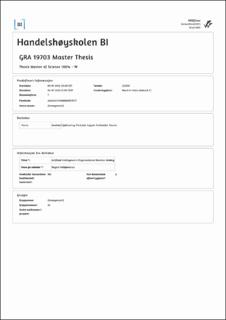Artificial Intelligence in Organizational Decision-Making
Master thesis
Permanent lenke
https://hdl.handle.net/11250/3098695Utgivelsesdato
2023Metadata
Vis full innførselSamlinger
- Master of Science [1621]
Sammendrag
Artificial Intelligence (AI) has been around since the 1950s, but its potential is yet
to be fully realized. Our findings suggests that AI can augment human intelligence
and allow for more efficient and rational decision-making processes, given that
the contingencies are effectively addressed. Inspired by the literature on
organizational decision-making and AI, our study is grounded in the belief that
understanding AI's impact on decision-making requires not just a technical
understanding of AI, but also a deep exploration of its integration and implications
within an organizational context. As such, we conducted interviews with various
experts and users, utilizing a cross-case analysis to answer the following research
question:
How do machine learning and natural language processing augment
operational decision-making processes in organizations?
This gave us valuable insights into the perceived definition of AI, attitudes and
expectations toward AI, and the benefits and challenges of AI in organizational
decision-making. Juxtaposing this with the theoretical foundation, we discuss our
most important theoretical findings: 1. Rationality and Accuracy, 2. Trust in AI, 3.
Organizational Structure and Strategic Goals, and 4. Problem Comprehension.
Following this, we provide a list of managerial recommendations, in addition to
addressing possible limitations with the study and suggestions for further research.
As such, we provide a holistic understanding of the dynamic factors and
intricacies central to successfully augmenting organizational decision-making
processes with AI.
Beskrivelse
Masteroppgave(MSc) in Master of Science in Business, Strategy - Handelshøyskolen BI, 2023
